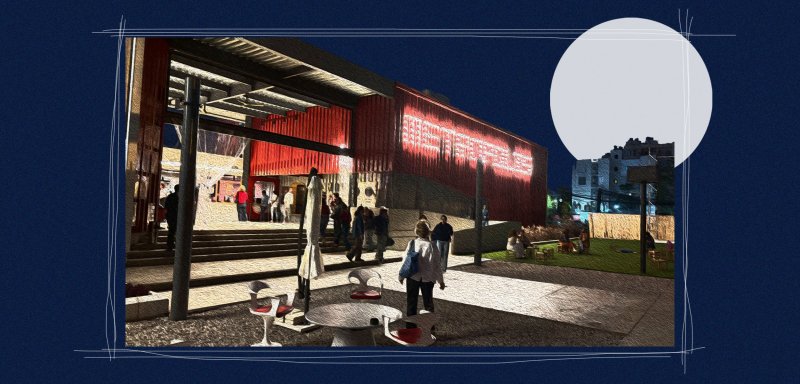Metropolis first opened in the bustling Hamra neighborhood of Ras Beirut, right before the start of the 34-day Israeli war on Lebanon in July 2006. The cinema quickly turned into a shelter but kept showing displaced children films to keep them entertained while indoors.
For nearly twenty years, Metropolis has shown films devoted to promoting independent cinema in Lebanon and the MENA region. Their aim is to grant greater accessibility to local and regional films as a substitute to major blockbusters in commercial theaters.
In January 2020, Lebanon’s crippling financial crisis lowered the shutters on the Metropolis Cinema Association. The independent cinema continued to operate without a venue, instead turning to alternative and outdoor spaces across the country to host their curated screenings and programs.
For nearly twenty years, Metropolis has shown films devoted to promoting independent cinema in Lebanon and the MENA region. Their aim is to grant greater accessibility to local and regional films as a substitute to major blockbusters in commercial theaters.
Before its closure, the cinema hosted over 160 film festivals and screened over 2000 films, becoming a cultural hub for film fanatics and independent cinema lovers. Attempts at finding a new venue and construction were further hindered by Israel’s war on Lebanon, which demoralized and discouraged the team’s morale. Despite the mounting obstacles, Metropolis reopened its doors in Beirut’s Mar Mikhael district last December.
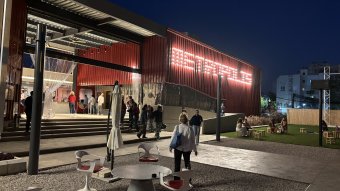
Attendees line up to enter the cinema. April 20, 2024. (Mahdi El Amin/Raseef22)
From January to February, Metropolis hosted the Doc. Screens Film Festival showcasing documentaries from countries including Tunisia, Armenia, and Lebanon. The cinema showed Ghassan Salhab’s Contretemp (2024), which documents a timeline of events since Lebanon’s uprising in October 2019 until the start of the genocide in Gaza in October 2023. They also screened Kaouther Bin Hania’s Four Daughters (2023) about a Tunisian family where two of four daughters leave to join ISIS in Libya.
In April, the cinema hosted the South Screens Film Festival which highlighted films from Asia, Africa, Latin America, and the Arab world that focused on sociopolitical injustices and imperial violence. The festival was a collaboration between Metropolis, Zawya in Cairo, Cinemadart in Tunis, and Cinema Akil in Dubai. Born out of a shared sense of powerlessness and angst amid the ongoing genocide in Gaza, the festival’s aim was to create and promote new cultural spaces connecting local and regional films to audiences empathetic toward the struggles faced across the Global South.
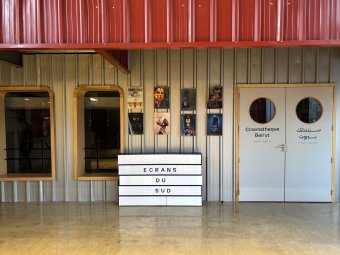
Posters for the South Screens Festival hanging on the walls of Metropolis. April 20, 2024. (Mahdi El Amin/Raseef22)
Alongside the South Screens Film Festival, Metropolis also organized the Beirut-Locarno Industry Academy, a workshop training young professionals in sales, marketing, distribution, exhibition, and programming in the independent movie industry. It included 17 participants from Lebanon, Egypt, Tunisia, and Morocco and 11 international guest-speakers and instructors.
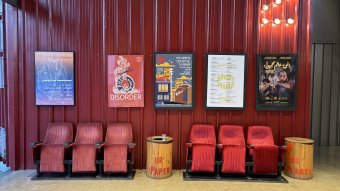
Waiting area at Metropolis near the concession stands. April 20, 2024. (Mahdi El Amin/Raseef22)
On April 20th, I attended a screening of the Persian film "The Seed of the Sacred Fig,” which won several awards in the Cannes Film Festival and received a nomination for Best International Feature Film at the Academy Awards.
With politics and news censored, art forms can act as means of portraying reality from the perspectives of those experiencing and suffering through imperial violence on the ground. Metropolis Cinema continues to play an important role in keeping those art forms, and stories, alive.
Set during the Iranian Revolution in 2022, the film follows two sisters, Rezvan and Sara, affected by Mahsa Amini’s death in police custody, whose father is a judge for the Islamic Revolutionary Court. The film documents the battle against patriarchal regimes in real time, illustrating how the fight isn’t merely on the streets but in the privacy of each household where the father is the despot, the mother an obedient follower, and Rezvan and Sara are the younger generation resisting their oppression. Coincidentally, the girls’ mother is targeted and blamed for her daughters' disobedience.
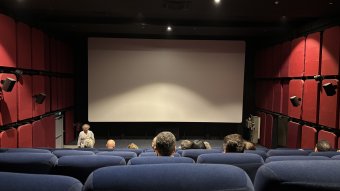
Attendees seated for the film “The Seed of the Sacred Fig” to begin showing at Metropolis. April 20, 2024. (Mahdi El Amin/Raseef22)
The film’s grueling footage of the Iranian morality police’s violence bares uncanny similarities with the brutality of Israel’s military forces. Real footage included blood running down the streets of Tehran during police raids. The film’s scenes compare to the mass arrests by German and American authorities during protests demanding the end of financial and political support to Israel. Meanwhile, the film’s focus on religious headscarves touched on France’s recent decision to ban French athletes from wearing it during the Olympics last summer. The audience, a mix of Lebanese viewers and foreign visitors, were captivated by the film throughout its nearly 3-hour runtime.
With politics and news censored, art forms can act as means of portraying reality from the perspectives of those experiencing and suffering through imperial violence on the ground. Metropolis Cinema continues to play an important role in keeping those art forms, and stories, alive.
Raseef22 is a not for profit entity. Our focus is on quality journalism. Every contribution to the NasRaseef membership goes directly towards journalism production. We stand independent, not accepting corporate sponsorships, sponsored content or political funding.
Support our mission to keep Raseef22 available to all readers by clicking here!
Interested in writing with us? Check our pitch process here!
